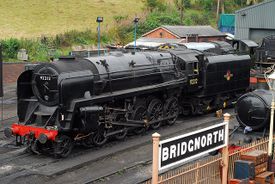Difference between revisions of "BR Standard 9F 92212"
m (Link added) |
m (Remove 'as of' date) |
||
| (One intermediate revision by the same user not shown) | |||
| Line 27: | Line 27: | ||
Following withdrawal, the loco was bought by Woodham Bros at Barry, arriving in September 1968.<ref name=BarryStory>[[Bibliography#Other References|Beckett and Hardingham (2010)]]</ref> In 1976 a group of prospective owners, the “9F Locomotive Society”, made a request to bring 92212 to the SVR if the Society was successful in acquiring the engine; the SVR’s Rolling Stock Committee agreed to this request<ref>SVR News 40</ref>. However when the loco left Barry in September 1979, it was for restoration on the Great Central Railway. That restoration was completed in 1996.<ref name=BarryStory/> | Following withdrawal, the loco was bought by Woodham Bros at Barry, arriving in September 1968.<ref name=BarryStory>[[Bibliography#Other References|Beckett and Hardingham (2010)]]</ref> In 1976 a group of prospective owners, the “9F Locomotive Society”, made a request to bring 92212 to the SVR if the Society was successful in acquiring the engine; the SVR’s Rolling Stock Committee agreed to this request<ref>SVR News 40</ref>. However when the loco left Barry in September 1979, it was for restoration on the Great Central Railway. That restoration was completed in 1996.<ref name=BarryStory/> | ||
| − | 92212 is owned by Jeremy Hosking and operated by Locomotive Services Ltd trading as Icons of Steam | + | 92212 is owned by Jeremy Hosking and operated by Locomotive Services Ltd trading as Icons of Steam<ref>[http://www.iconsofsteam.com/about/ Icons of Steam website] (Retrieved 13 February 2017)</ref>. |
===92212 at the SVR=== | ===92212 at the SVR=== | ||
Latest revision as of 13:03, 29 February 2024
SVRSevern Valley Railway during 2000-2001 and again in summer/autumn 2011.It is a British Railways Standard Class 9FThe British Railways system of classifying steam locomotives by power using a number from 0, least powerful, to 9, most powerful, followed by either F for freight, P for Passenger or MT for Mixed Traffic. 2-10-0 locomotive, one of the final batch of steam locomotives built by British Railways at Swindon Works. The 9FThe British Railways system of classifying steam locomotives by power using a number from 0, least powerful, to 9, most powerful, followed by either F for freight, P for Passenger or MT for Mixed Traffic. class was the last of the BRBritish Rail or British Railways Standard classes designed by RA RiddlesRobert Arthur "Robin" Riddles, Member of the Railway Executive for Mechanical and Electrical Engineering responsible for the design of the British Rail Standard Class locomotives. One of the most powerful steam locomotive types ever constructed in Britain, their size and shape earned them the nickname 'Spaceships'. They were intended for use on fast, heavy freight trains over long distances, although they were also used successfully on passenger services, in particular on the Somerset and Dorset Railway[1].
Service
92212 entered service at Banbury on 30 September 1959. In June 1961 it was reallocated to Bath Green Park, from where it worked on the Somerset & Dorset line. Another allocation to Tyseley depot in Birmingham followed in July 1962 with a final move to Carnforth in November 1966. It was withdrawn from there in January 1968 after 8 years 4 months in service[2].
Preservation
Following withdrawal, the loco was bought by Woodham Bros at BarryWoodham Brothers Scrapyard, Barry, South Wales. The source of many locomotives now in preservation., arriving in September 1968.[3] In 1976 a group of prospective owners, the “9FThe British Railways system of classifying steam locomotives by power using a number from 0, least powerful, to 9, most powerful, followed by either F for freight, P for Passenger or MT for Mixed Traffic. Locomotive Society”, made a request to bring 92212 to the SVRSevern Valley Railway if the Society was successful in acquiring the engine; the SVRSevern Valley Railway’s Rolling Stock Committee agreed to this request[4]. However when the loco left BarryWoodham Brothers Scrapyard, Barry, South Wales. The source of many locomotives now in preservation. in September 1979, it was for restoration on the Great Central Railway. That restoration was completed in 1996.[3]
92212 is owned by Jeremy Hosking and operated by Locomotive Services Ltd trading as Icons of Steam[5].
92212 at the SVRSevern Valley Railway
92212 was hired to the SVRSevern Valley Railway in winter 2000/01 to help operate the Santa Special services, as the home fleet was at the time still recovering from the recent boiler crisis. It arrived by road on 21 November 2000[6] and left at the end of March 2001, having made an appearance at the Spring "Branch Line Gala Weekend" on 2-3 March 2001.[7]
92212 was hired again by the SVRSevern Valley Railway in summer 2011, the home fleet being 'one short' at the time. It arrived in June 2011 and entered service after repairs to a broken spring. It left after appearing in the Autumn 2011 Steam Gala[8].
See also
- Steam Locomotives hired by the SVR
- Steam Locomotives visiting the SVR for galas
- BR Standard 9F 92214
- Classes of locomotives used on the Severn Valley Branch in commercial service
References
- ↑ Wikipedia
- ↑ BR Database (retrieved 10 April 2018)
- ↑ 3.0 3.1 Beckett and Hardingham (2010)
- ↑ SVRSevern Valley Railway News 40
- ↑ Icons of Steam website (Retrieved 13 February 2017)
- ↑ SVRSevern Valley Railway News 134
- ↑ SVRSevern Valley Railway News 136
- ↑ SVR-Online Forum
